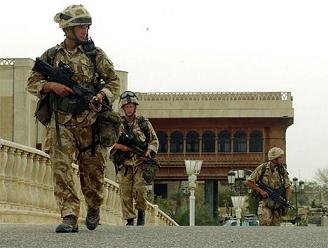Iraq: The Road to Tyranicide

As the U.K. Enquiry by Sir John Chilcot seeks testimony from those affected by the Iraq invasion, Iraq Solidarity Campaign founder Hussein Al-Alak, writer on Middle East issues and veteran campaigner, gives a revealing glimpse into the duplicity of enormity which led to the 2003 and subsequent tyranicide.
“The whole background began in the 1980s and the founding of The Campaign Against Repression and for Democratic Rights in Iraq (CARDRI) by Ann Clwyd, M.P., known by many as ‘Mrs Talabani’ because of her close association with the Kurdish movement.”
“When the Kurdish automous region was eventually established and had their first ‘free’ elections in the early 1990’s CARDRI were invited as monitors.” Foxes and hen houses come to mind. CARDRI joined the Israeli representatives and the CIA, already established in Kurdistan.
“The three bibles of CARDRI were ‘The Republic of Fear’, and two CARDRI collections of writing”, says Al-Alak:
‘Saddam’s Iraq – Revolution or Reaction’, and ‘Iraq After the Gulf War – the Case for Democrocy’. Contributers included Ahmed Chalabi – who left Iraq in 1958, was convicted for bringing down Jordan’s Petra Bank (a conviction he claimed was politically motivated) the Dawa Part, ‘a Shi’ite party under Iranian influence’ (1) SCIRI, also with strong Iranian links and the Iraq Communist Party.
Iraq’s ‘Prime Minister’ Nuri Al Maliki, is allied to the Dawa, which tried to assassinate President Saddam and then Foreign Minister, Tareq Aziz in Dujail, in 1982.
It was CARDRI, alleges Al-Alak, which created the stories of human shredding machines and boiling alive in acid in Iraq. It seems that even since the invasion, no convincing picture has emerged of either.
CARDRI, states Al-Alak, was split over the 1991 onslaught, but the Iraqi Communist Party allegedly received money from Moscow and Eastern Europe, which also allegedly, found its way into CARDRI coffers.
Subsequently Ahmed Chalabi (whose parents had been favoured by the British in their previous Iraq adventures) formed the Iraqi National Congress (INC), selling it as an almost ANC, anti-apartheid in Iraq, concept. “The I.N.C. gave a lot of people a feeling of self importance”, comments Al-Alak.
“Although the regime was repressive, the huge exaggeration of human rights abuses became the norm. There was a ‘strategy’ to talk of the dozens of families of members who had been murdered, by an organisation which worked on a campaign of hearsay and chinese whispers. When questioned on hard facts, the policy was to burst into tears”, he alleges. “Halabja, of course, made anything possible.”
“Even the words used were dictated, the whole thing was orchestrated, a set-up, such as instructions to say ‘small children’ were routinely murdered.”
Subsequently INDICT was launched in the British Parliament, when the INC was stumbling, to label Saddam Hussein the ‘new Hitler’ and ‘Butcher of Baghdad’ and funded generously by the Free Iraq Foundation, not a million miles from the CIA.
“2003 was entirely down to the INC and INDICT” claims Al-Alak:”Then in the wake of the horrors it produced, Ann Clwyd became Tony Blair’s ‘human rights advisor’ to Iraq.” Truth sure outdoes fiction.
“The whole disaster has a lot to do with a convicted embezzler, a woman, and others with some interesting connections to both CIA and agencies in eastern Europe – and ultimately CARDRI connections got high positions in the interim Iraqi government and in the British parliament. Clwyd herself became Deputy Chair of the Labour Party.
“We can rest assured that the British soldiers who died in Iraq met their fate in no small measure to the actions of the former Deputy Chair of the Labour party.”
Democratic Iraq Elections?
Al-Alak has an interesting view. “Of Iraqi background,you could be born in the UK or US, yet vote on the future of a foreign country, in an election entirely illegal as the country is under occupation. More astonishing, as British soldiers died for ‘freedom and democrocy’, Iraqis were lining up on the streets of London and Manchester to vote for a Quisling regime, many with ties closer to Tehran than Baghdad.”
“According to sources in the Iraqi resistance, there was evidence that within the UK, people were being allowed to vote a number of times bacause they were friends, or related to, or members of the same political party, as those who were manning the polling booths.”
“Dawa had an exceptional amount allocated for the election (including Foreign and Commonwealth Office money) with rumours that in one instance, £30,000 went missing.”
The Galloway Dossier
Any Iraq watcher will remember the pristine dossier found in a burned out Baghdad building, purportedly written on Iraqi government writing paper implicating MP George Galloway in various nefarious dealings. (He won libel cases against publications who printed them.)
“Because of his stance against the embargo and perceived relationshsip with Saddam Hussein and Tareq Aziz, the dossier was entirely written by members of the Iraqi opposition in Jordan and edited in the North West of England, by people closely associated with CARDRI”, alleges Al-Alak, adding: “It is believed that one of the editors is known as ‘Cashmere Coat’, since his sartorial tastes seem distinctly at variance with his less than towering salary.”
Ann Clwyd was defeated as Chair of the Labour Party by Tony Lloyd in December 2006, being seen as too close to Tony Blair, whose political gloss had become considerably tarnished. However a quick check on her name comes up on a site for Labour Friends of Iraq – and a direct link to the Dawa Party. “Kurdish nationalist” Jalal Talabani is President of Iraq.
There were, the cynic might ponder, a few enemies within.
Note
(1) From Sumer to Saddam, Geoff Simons, Macmillan, 1994.

